- 3,386
- 1,433
- 113
- Location
- The actual midwest, NM.
Not having the special tool, I've simply used a hair dryer to soften up the plastic a bit, then push it in place.Tell me more about the special tool.
Steel Soldiers now has a few new forums, read more about it at: New Munitions Forums!

Not having the special tool, I've simply used a hair dryer to soften up the plastic a bit, then push it in place.Tell me more about the special tool.
I have extras because I figured someone else would run into the same problem I had. $5 to your door if you want one. PM me.Well I certainly need one, PM me if you want to sell me one, or let me know your source, and I will order some as well.
I posted a picture of my tool on page 204. Couch posted a picture of his on page 203. Picture of mine:https://www.steelsoldiers.com/showt...Owners-group&p=1977442&viewfull=1#post1977442Tell me more about the special tool. As many lines as there are going all over the place, I suspect I will need to become proficient at making hard lines as well. As Peakbagger said as the lines age the plastic loosens up and leaks at the joints. I am sure that the regulation way to correct that is to just replace the line and if cheap / easy enough that is probably the best way to fix it. My inclination is to follow Peakbagger's solution though.
Do you use heat like FLU farm suggested? Or just use the tool and a mallet? It looks like it has slots for 5 sizes of tubes. Is that sufficient for the sizes used on a SEE?I posted a picture of my tool on page 204. Couch posted a picture of his on page 203. Picture of mine:https://www.steelsoldiers.com/showt...Owners-group&p=1977442&viewfull=1#post1977442
Words cannot explain how easy this is. It makes me want to convert everything else to this type of line. The hard plastic line doesn’t flop around like rubber, so it is easier to route. You can get clear lines so you can see fuel
Drilling a stepped hole into the joint line of two clamped-together blocks of aluminum or hardwood is not as fancy but works just as well.The tool clamps the hose tight on one side and is relieved for the hose to expand on the other side. Clamp hose in the tool and smack the fittings in with a rubber mallet.View attachment 666343
I like the sounds of that. The tool looks like vice grips attached to a kind of hard rubber/plastic form. From Speedwoble's description, and the picture I would guess that the bottom hole is slightly under sized to grip the line, and the top is slightly oversized to allow the line to expand when the fitting is driven in. The advantage of the roll your own approach is that you can accommodate all the different sizes on th FLU. I think a heat gun before and after like FLU farm suggested might create the best results in conjunction with the form. The factory joints kind of look like they are shrink wrapped over the fitting.Drilling a stepped hole into the joint line of two clamped-together blocks of aluminum or hardwood is not as fancy but works just as well.
I haven't had any issues with my front hydraulics but if the fluid is heating up you have one of two issues, some component is creating resistance in the fluid circuits or the hydraulic cooler fan is not working. There is a known issue with SEEs that the hydraulic cooler fans failed due to water leaking into grommets. The fan only runs when the fluid gets warm enough. The electrical troubleshooting has some very good diagnostics on the fan system. (Unfortunately there is no source of new fans unless you want to buy the entire unit. I just bought 24 volt truck cooling fans and retrofitted the mounts)
These diagrams came from the technical download forums from a student handbook that a member uploaded. They may be helpful (as are all the other diagrams that are not in the official services manuals)
I would ensure that the fan and thermostat is working and then my next guess would be look for something plugging the device labeled "CHOKE" .
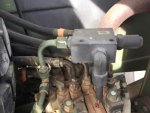
Have you checked that your auxiliary circuit is turned off? The most heat will come if some valve is halfway on and forcing the pressure through the pressure relief.This brings up an interesting observation: the front hydraulics don't seem to heat up much when constantly using them, but can get hot when the engine is running and not being used. I am almost ready to call a professional and have him take a look if I can't get anything figured out soon. Any and all suggestions would be appreciated. The cooler fan is working, so that is not the problem. Thanks.
That sure sounds like a restriction somewhere in the system to me. Or, like Speedwoble suggested, the tool circuit is on, but without the high idle function.This brings up an interesting observation: the front hydraulics don't seem to heat up much when constantly using them, but can get hot when the engine is running and not being used.
No. This is not heat shrink tubing. If anything, it slightly expands when heated.I like the sounds of that. The tool looks like vice grips attached to a kind of hard rubber/plastic form. From Speedwoble's description, and the picture I would guess that the bottom hole is slightly under sized to grip the line, and the top is slightly oversized to allow the line to expand when the fitting is driven in. The advantage of the roll your own approach is that you can accommodate all the different sizes on th FLU. I think a heat gun before and after like FLU farm suggested might create the best results in conjunction with the form. The factory joints kind of look like they are shrink wrapped over the fitting.
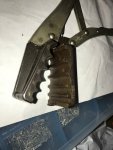
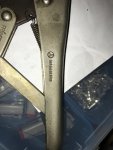
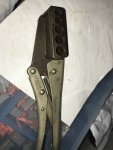
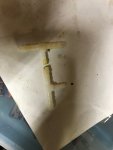
I am sure it is turned off at the switch, but have not checked to see if there is any residual pressure in the lines. I will check it tomorrow when there is some light outside. Daylight Savings sure brings the darkness early these days.Have you checked that your auxiliary circuit is turned off? The most heat will come if some valve is halfway on and forcing the pressure through the pressure relief.
Those Tees look like something available in the "Help" section of most auto parts store.
6mm is close to 1/4, a little smaller .236Those Tees look like something available in the "Help" section of most auto parts store.
If not (actually, regardless), I would use a brass Tee and three barbed fittings if I needed one.
Maybe not, which is what making one from an NPT Tee and three barbed brass fittings is more appealing to me.I don't know might be able to find a tee like that at the auto parts store.
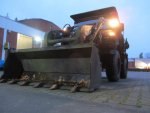
With the highly publicized onset of global warming, I wasn't going to use any anti-gel this winter....filled up tanks from the vehicles full to the neck with diesel, biozid and flowfit for winter.
Thats´s pretty cold. If you work around your house there´s no problem but if you get some roadspeed for some minutes perhaps the fuel filters get much colder.With the highly publicized onset of global warming, I wasn't going to use any anti-gel this winter.
But I may have to rethink that. It's supposed to be 10 degrees tonight.
Oh, 10 degrees isn't particularly cold for around here in the winter. It'll get down to -20 at times.Thats´s pretty cold. If you work around your house there´s no problem but if you get some roadspeed for some minutes perhaps the fuel filters get much colder.
We get it, advertisements are annoying!
Sure, ad-blocking software does a great job at blocking ads, but it also blocks useful features of our website like our supporting vendors. Their ads help keep Steel Soldiers going. Please consider disabling your ad blockers for the site. Thanks!
